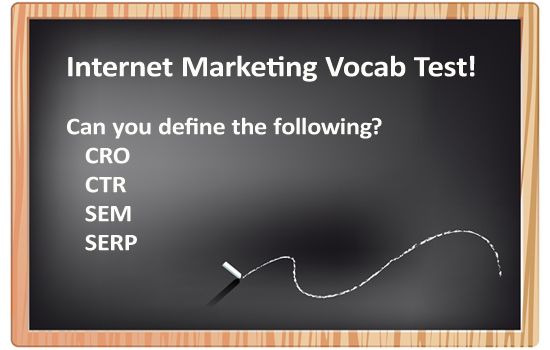From SEO to PPC, the world of online marketing is rife with shorthand that represents complex concepts and strategies. Whether you’re a seasoned marketer looking to refresh your knowledge, a newcomer eager to dive into the digital marketing world, or a business owner looking to understand what their marketing team is saying.
This list will help demystify the jargon and provide you with a clearer understanding of the tools and techniques that are shaping the future of online business.
The following are a few of the most common digital marketing acronyms used in the industry today and what they mean for your website’s success.

SEO – Search Engine Optimization: The process of optimizing a website to rank higher in search engine results pages (SERPs) for specific keywords or phrases.
SEM – Search Engine Marketing: A broader term than SEO, it includes SEO tactics as well as other marketing strategies like paid search advertising (e.g., Google Ads).
PPC – Pay-Per-Click: An advertising model where marketers pay a fee each time one of their ads is clicked. Commonly associated with search engine and social media advertising.
CPC – Cost Per Click: The amount paid by an advertiser for a single click on their ad, leading the user to their website or landing page.
CPM – Cost Per Thousand Impressions (M is the Roman numeral for 1,000): A metric used to denote the price of 1,000 advertisement impressions on one webpage.
CTR – Click-Through Rate: The percentage of people who click on an ad after seeing it. It is calculated by dividing the number of clicks by the number of impressions.
CRM – Customer Relationship Management: Strategies and technologies used by companies to manage and analyze customer interactions and data throughout the customer lifecycle.
CMS – Content Management System: A software application used to create, edit, manage, and publish content in a consistently organized fashion (e.g., WordPress).
ROI – Return on Investment: A measure used to evaluate the efficiency or profitability of an investment, calculated by dividing the net profit by the cost of the investment.
KPI – Key Performance Indicator: A type of performance measurement that evaluates the success of an organization or of a particular activity in which it engages.
SMM – Social Media Marketing: The use of social media platforms to connect with your audience to build your brand, increase sales, and drive website traffic.
UX/UI – User Experience/User Interface: UX refers to the overall experience a user has with a company’s products or services, while UI focuses on the specific layout and design of the product interface.
GA – Google Analytics: A web analytics service offered by Google that tracks and reports website traffic.
SERP – Search Engine Results Page: The page displayed by a search engine in response to a query by a searcher.
HTML – HyperText Markup Language: The standard markup language for documents designed to be displayed in a web browser.
CSS – Cascading Style Sheets: A style sheet language used for describing the presentation of a document written in HTML or XML.
CRO – Conversion Rate Optimization (CRO) is a metric to determine the effectiveness of a website call-to-action. In internet marketing, the goal of CRO can be to convert site visitors to buy a product, download a game, sign up for a newsletter, or request an estimate.
SERPs – SERPs is shorthand for Search Engine Results Pages. These are the pages of suggested websites that show up when a search engine runs your search query. So for example, an internet marketing consultant could say “Our SEO tactics have helped your website show up on the first page of the Google and Bing SERPs for x, y, z keywords.”
CTA – Call To Action: A marketing term for any design to prompt an immediate response or encourage an immediate sale.
SGE – Google Search Generative Experience (SGE) is a set of search and interface capabilities that integrates generative AI-powered results into Google Search, aiming to enhance the user’s ability to learn new things and understand key concepts while searching online. This approach uses generative AI to create more dynamic and contextually relevant search experiences.






